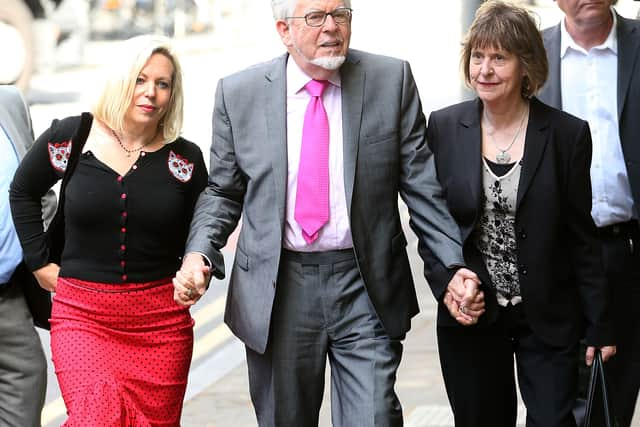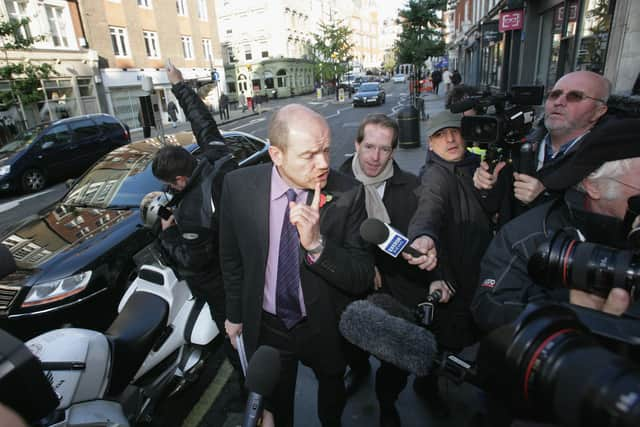BBC scandal: the litany of BBC controversies as its current presenter scandal unfolds
and live on Freeview channel 276
There are once again growing calls about the culture within the walls of the BBC, with news over the weekend that an unnamed, yet “household name,” presenter is being investigated regarding paying a then 17-year-old for explicit photographs across a period of time for the sum of £35,000. As of this morning, the Metropolitan Police are to be involved while a number of BBC personalities over the weekend took to social media to distance themselves from the controversy.
Though there are arguments that 16 is the age of consent, the making and distribution of sexual images between the ages of 16 and 18 is still considered illegal by law, alongside continued discussions about the power dynamic between presenters and other employees after the recent ITV controversy surrounding Phillip Schofield.
Advertisement
Hide AdAdvertisement
Hide AdIt’s the latest in a long line of controversies outside of editorial standards that the BBC has found itself in, with a small but noisy contingent taking to social media now to ask if this is the reason the BBC require a lot of money in the form of the TV Licence fee - long a controversial aspect of the broadcaster since its inception back in 1946.
Those who have taken umbrage to the news have been quick to point out that this isn’t the first time that the broadcaster has been embroiled in allegations of sexual assault and misconduct, with parallels drawn to the perceived “hush hush” nature surrounding Jimmy Saville’s crimes while with the broadcaster, which ultimately led to Operation Yewtree and the revelation of historic offences at the BBC.
For those people, they believe that the broadcaster should now be held accountable for the workspace environments fostered by the company, which had allowed for one of their presenters to court a young person for explicit photos despite the extent of sexual harassment, bullying and indecency proven to have taken place at the BBC years beforehand.
Are those people correct that the BBC needs to clean it’s house out, given the nature of this latest scandal and how it eerily echoes the same notions that the broadcast vowed to safeguard after the fallout from the Jimmy Saville scandal only 11 years ago?
Operation Yewtree


Advertisement
Hide AdAdvertisement
Hide AdThough Operation Yewtree was predominantly looking at the offences committed by Jimmy Saville during his time at the BBC, the operation cast its net out wider to look at other individuals who had been referred to BBC executives in the past for their indecent conduct.
Operation Yewtree saw guilty charges for Rolf Harris, Stuart Hall and Max Clifford, with a number of other names accused but not charged after “robust” investigations made by both the BBC and the British police.
Cliff Richard
In 2014, the BBC faced a significant controversy surrounding its coverage of a police raid on the home of British singer Sir Cliff Richard. The broadcaster had received information about historical sexual assault allegations against Richard and provided extensive live coverage of the search, including helicopter footage.
Critics argued that the coverage invaded Richard's privacy, was sensationalist, and lacked sensitivity towards his reputation, as he had not been formally charged with any offence at that point. Sir Cliff Richard took the BBC to court in 2018, with the court ruling that the broadcaster had breached his privacy rights and criticisms that in light of Operation Yewtree that the coverage “overcorrected” their situation regarding offences the broadcaster was still embroiled in.
The Russell Brand Show prank calls row


Advertisement
Hide AdAdvertisement
Hide AdThe “boys club” culture of the BBC was brought to the forefront in 2008 during an episode of "The Russell Brand Show.” During the program, host Russell Brand and Jonathan Ross left offensive and inappropriate voicemail messages for actor Andrew Sachs, known for his role as Manuel in the television series "Fawlty Towers."
The voicemails, which were intended as a prank, contained explicit and derogatory comments about Sachs's granddaughter and sparked public outrage. The incident became a significant controversy due to the offensive nature of the messages and the fact that they were broadcast on a publicly funded BBC radio program.
The incident led to a widespread backlash from the public, media watchdog groups, and politicians, who criticised the inappropriate behaviour and the lack of editorial oversight at the BBC. The controversy resulted in the suspension of Russell Brand and the resignation of the BBC controller responsible for Radio 2.
Accusations of ageism and sexism
Those “boys club” allegations have dogged the broadcaster before Russell Brand and Jonathan Ross’ controversial radio show episode; in April 2007, Moira Stuart, the first black female television newsreader, was dismissed after over two decades of presenting, leading to allegations of ageism and a double standard compared to male presenters who were allowed to continue in similar situations. In November 2008, four female presenters in their 40s and 50s, including Michaela Strachan and Miriam O'Reilly, were also dismissed from the show Countryfile, sparking further criticism.
Advertisement
Hide AdAdvertisement
Hide AdThe controversy resurfaced in July 2009 when Arlene Phillips, a 66-year-old former theatre choreographer, was replaced on the Strictly Come Dancing panel by Alesha Dixon, who was half her age. This decision raised concerns about ageism, particularly as the male panellists on the show were significantly older. Miriam O'Reilly, in a subsequent employment tribunal, successfully claimed against the BBC for ageism and victimisation, although the tribunal did not find evidence of sexism.
The BBC's treatment of older women prompted criticism from figures like Joan Bakewell and Menzies Campbell, who argued that the corporation's policies were detrimental to the position of older women in society and reflected a shallow focus on youth culture.
Comment Guidelines
National World encourages reader discussion on our stories. User feedback, insights and back-and-forth exchanges add a rich layer of context to reporting. Please review our Community Guidelines before commenting.
